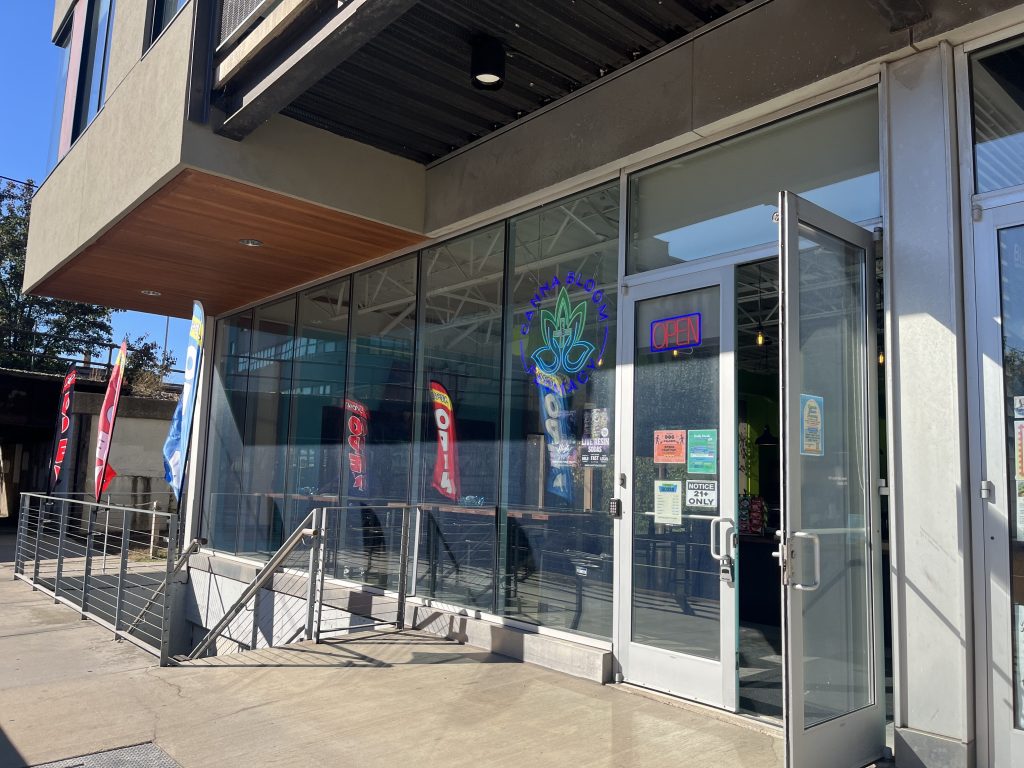Cannabis Lounge Opens in Walker’s Point
Canna Bloom Farmacy offers flower, extracts, edibles and infused beverages in a social setting.

Canna Bloom Farmacy, 161 S. 1st St. Photo taken Oct. 9, 2025 by Sophie Bolich.
Hartford-based Canna Bloom Farmacy has expanded with a new lounge in Walker’s Point, inviting guests to explore its cannabis flower, extracts, edibles and infused beverages in a social setting.
Unlike traditional retail-focused dispensaries, the new lounge at 161 S. 1st St. is designed as a gathering place, featuring bar and table seating, on-site consumption options and knowledgeable staff to guide visitors through their experience.
Co-owner Stephanie Lembke said she aims to provide an alternative to tavern culture, especially for younger crowds trending away from alcohol consumption.
“THC drinks have been skyrocketing, where alcohol [consumption] has been going down,” Lembke said. “I wanted to have a safe place for people to come and hang out and socialize, where they don’t feel pressured into drinking alcohol.”
Offerings ranging from infused cotton candy to sippable smoke are crafted with organically grown THCA flower from Canna Bloom’s indoor facility in Hartford. The Milwaukee storefront also has a full THC bar with alcohol-free mixed drinks like old fashioneds and slushies, along with packaged snacks and a retail section.
“We actually make all of our own products,” Lembke said, adding that the company also partners with trusted farms across Wisconsin and aims to expand that network as it grows.
Three of Wisconsin’s border states—Minnesota, Illinois and Michigan—have legalized recreational marijuana. Its “island status” disrupts both the industry and consumers, leading to an influx of low-quality products, said co-owner Justin Letizia.
“We totally think that, because of where the market is in Wisconsin, a lot of people haven’t had the chance to experience some of the higher-end stuff. We’ve been kind of flooded with trash products, unfortunately.”
Canna Bloom’s “seed-to-store” model sits at the high end of cannabis culture, prioritizing flavor and experience over chasing a quick buzz, according to Letizia, who compared the lounge setting to that of upscale bourbon and whisky bars.
“It’s more of a treat, and you can really understand the work that goes into some of these connoisseur-type products,” Letizia said. “We love educating our customers about the different flavors and the different effects that go along with all the different varieties that we produce here in the state.”
Lembke knows many Wisconsinites prefer to cross state lines for their purchases, but she said that’s not necessary. “Ours is federally compliant, and it it still gives the same effects.”
Canna Bloom brands, including Happy Daze and Diamond Delight, are sold at more than 500 stores across the state. They’re also available for purchase at the company’s Milwaukee and Hartford storefronts.
Lembke is working to secure an entertainment license for the Milwaukee space, with plans to host EDM performances, comedians, gaming tournaments and more. In the coming days, TVs will be tuned into the Milwaukee Brewers‘ playoff games.
The Walker’s Point lounge is open Tuesday through Thursday from 11 a.m. to 7 p.m., Friday and Saturday from noon to 10 p.m. and Sunday from 11 a.m. to 5 p.m.
Updates, deals and discounts are regularly posted on Facebook.
What About the New Farm Bill?
Wisconsin saw a surge in new dispensaries after the 2018 Farm Bill legalized hemp-derived alternatives to marijuana. While both come from the cannabis plant, hemp contains 0.3% THC or less by dry weight, whereas marijuana contains more than 0.3% THC.
Lawmakers are now attempting to redefine hemp products under state statute, effectively banning psychoactive THC products in Wisconsin—a move that would threaten the livelihoods of sellers, producers and dispensary owners across the state.
Letizia welcomes additional regulation, but urged those in opposition to shift their perspective on what he sees as a booming industry.
“We have several companies in Wisconsin that are taking off nationwide—including us—because of our infrastructure related to agriculture and brewing,” he said. “We have the equipment, we have the farmland. So when is it no longer a loophole, and when does it become an industry we’re leading the nation in that we desperately need to regulate?”
Last year, Letizia and Lembke met with Jim Piwowarczyk, one of two Republican state representatives who introduced an amendment to the bill last month.
“I feel these products are not going away, but I also agree with [Piwowarczyk’s] standpoint that these things need to be safer, they need to be tested, they need to have age restrictions,” Letizia said. “So what can we do to work together in order to make this safer for everybody?”
Despite his original openness, Letizia said Piwowarczyk has not been receptive to more recent attempts at outreach. “That olive branch was declined to our face.”
Letizia compared the controversy to earlier debates over alcohol.
“One of the big things … that the alcohol industry did wrong initially was not promote safety enough,” he said. “Famously, the alcohol industry had to add the tagline, ‘Please drink responsibly’ because of that kind of pressure. We don’t want the cannabis industry to have to do that. We want to be responsible off the bat.”

Existing members must be signed in to see the interactive map. Sign in.
If you think stories like this are important, become a member of Urban Milwaukee and help support real, independent journalism. Plus you get some cool added benefits.




















